A Quote by Howard Rheingold
Personal computers were created by some teenagers in garages because the, the wisdom of the computer industry was that people didn't want these little toys on their desk.
Related Quotes
Right now, 70 percent of the people don't have computers. And where they're needed most, people don't have them. We think this will enable anyone to own a computer. We're aiming at everybody who uses a computer as an information access device. The original idea was to build one cheaply enough to put one on every desk.
Collections are certainly abundant online. It's complicated, because it's not like these people didn't want computers, although there was some nonchalance about it. I would sometimes ask the people I interviewed if they wished they had a computer, and in a lot of cases, it was like they couldn't process the question. You don't know what you don't have, I guess.
Every disruptive innovation is powered by a simplifying technology, and then the technology has to get embedded in a different kind of a business model. The first two decades of digital computing were characterized by the huge mainframe computers that filled a whole room, and they had to be operated by PhD Computer Scientists. It took the engineers at IBM about four years to design these mainframe computers because there were no rules. It was an intuitive art and just by trial and error and experimentation they would evolve to a computer that worked.




































